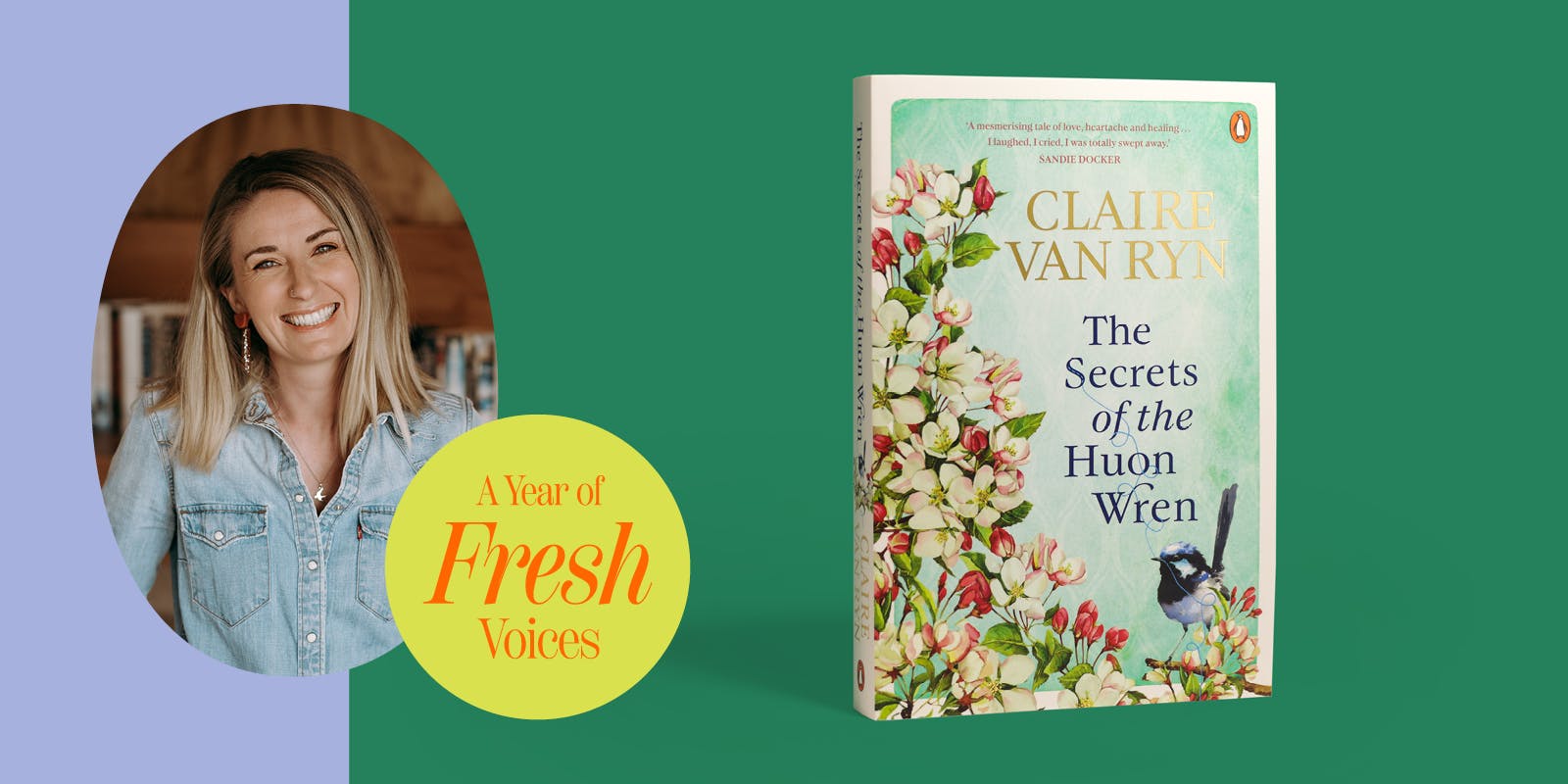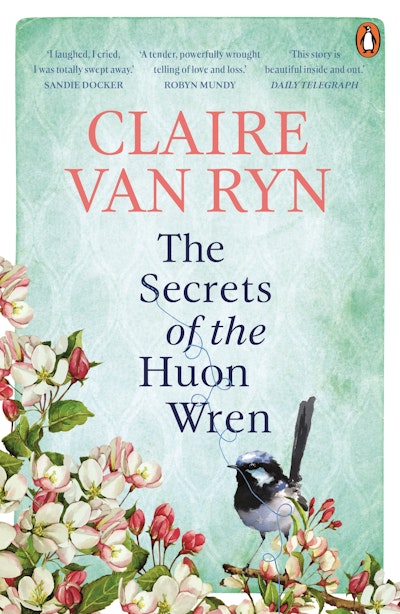Plus, find out what inspired Claire's first novel and how her previous work experience helped her write The Secrets of the Huon Wren.
What was your writing process like for The Secrets of the Huon Wren? Did you have a writing routine or any regular rituals?
At the beginning of 2020, as Covid was making itself known, I lost my job. It proved to be a blessing in disguise, as I had planned to write my first novel that year. And I did!
I set myself daily word targets, but I tried not to put too much pressure on myself, particularly with my two kids and hubby home during the Tasmania lockdown.
I would describe my writing as a spiritual practice. When I write, it’s like I’m on holy ground. The words always flow when I’m in tune with the Creator himself.
So my daily writing rhythm goes like this: pray, relinquish, write.
Pray for clarity, inspiration, dedication and over any challenges.
Relinquish the results to God. There’s a heaviness that comes with the pressure we place on ourselves to be productive. Ironically, that very energy can block creativity and flow. Relinquishing my work is like saying, ‘It’s yours, not mine; use me.’ And that is incredibly freeing.
And write. That one speaks for itself! But it takes discipline to turn up again and again with a commitment to moving the story forward.
How did you first come up with the idea for the book?
The idea for The Secrets of the Huon Wren was sparked by a campfire conversation in 2018 on a family caravan trip. We were in Mareeba, in the Atherton Tablelands of North Queensland, the kids tucked up in bed in the van nearby.
We were contentedly sipping wine and listening to a fellow traveller share some of her experiences working as a police officer and then a nurse. It did cross my mind that a certain amount of embellishment may have been applied, but such is the nature of campfire stories!
One story sent chills down my spine and lodged like a splinter under my skin. She spoke of a woman she’d cared for who had advanced dementia and cradled a doll like it was her newborn baby, muttering haunting sentences that held a ring of truth. ‘Daddy took my baby behind the shed…’ Those scant details brewed in my mind, growing and developing into the story I would eventually write.
What was your big break into publishing?
Having my book published by Penguin Random House is by far the biggest break of my writing career, but when I look back, I see many smaller triumphs that have brought me here.
I worked as a print journalist for about ten years. Landing that job was hard work. Then, the role of features reporter, writing the in-depth articles I loved, permitting me to write with expression and colour rather than the tight news articles I’d come to loathe. I had a column that gave me the freedom to explore my faith as it intersects with everyday life. Those were triumphs too.
It was my agent, Fiona Smith of Beyond Words Literary Agency, who positioned my manuscript beneath the eyes of PRH publisher Ali Watts. I am so thankful that these two women not only took the time to consider my work but also that they identified with its themes and saw its value.
How long have you been working on this book?
I could say that I’ve been working on this book my whole life! It includes so many of my personal experiences and observations. But technically, the first draft of The Secrets of the Huon Wren was written in 2020 over nine months (isn’t that appropriate!). I let it breathe for a while before returning to it with many edits, including one by an independent professional.
It took two years before I found an agent and stepped back to let her work her magic. Then, there were more rounds of edits once the book was signed by PRH.
What was the publishing process like (finding an agent, submitting manuscripts, etc.)?
I always hoped that a traditional publishing house would pick up this book. To give myself the best chance of achieving that, I knew that I had to first find an agent to represent me.
I approached eight agents before getting the thumbs-up from Beyond Words. That was challenging at times. Some never responded (dear agents, please just put us out of our misery, a no is better than nothing at all!) Others had feedback that contradicted previous edits, making me question my decision-making.
At the end of the day, I had to learn to be okay with my manuscript not hitting the mark with some. Taste is incredibly subjective.
I signed with Fiona in November 2021 and by May 2022, I signed a contract with Penguin Random House. Those six months were excruciating, though I now realise that it was actually a very short wait.
The editing process happened during the second half of 2022 while I was on a year-long lap of Australia with my family in a 21-foot caravan. What a charming year it was!
Relinquishing the process to God, my agent and my publisher paid off, as I fully enjoyed the diverse landscapes of Australia, stopping here and there for a few days of intense edits and phone calls when we were hooked to power and with decent reception.
The day before we boarded the ferry home to Tasmania, I visited the PRH Melbourne office and picked up the first Advanced Reader Copies of my book! It was an exhilarating end to two different journeys.
What most excites you about your book being published in 2023?
I am most excited about the prospect of connecting with readers. It’s a nervous excitement because I want them to love it! I want to know what characters they relate to, what made them laugh, cry, cringe, ponder. Did they grasp the themes and symbology? Did they feel planted in the setting?
It’s also surreal to think that people all over Australia will be reading my book!
Do you have a favourite book or author?
No! There are too many books in the world, and too many talented writers to narrow it down. But some that have made an impression are The Chronicles of Narnia by C.S. Lewis (I loved reading these aloud with my kids), Year of Wonders by Geraldine Brooks, anything by Katherine Scholes, oh and I loved Eleanor Oliphant is Completely Fine by Gail Honeyman. I could go on.
What inspired you to become a writer?
I’m not sure I was inspired to become a writer as much as I eventually acknowledged that I am a writer.
There’s an innate joy in writing for me that, if left unsated, would likely turn me into a monster! Part of living a faithful life is acknowledging our unique giftings and using them. To suppress it, in a sense, would be to turn my back on God.
What did you want to be when you grew up and why?
A dancer!
I started a dance degree and quit six months in. Then I started a law degree, which I lasted in for a year. Talk about leaping from one end of the spectrum to the other! I ended up with an arts degree, majoring in English. I was pretty lost as a teen, trying to figure out what I wanted to ‘be’. After getting married and living overseas for a bit (read: maturing), I started working earnestly to turn my love for writing into a career.
If you could go back in time and give your past self one piece of advice, what would it be and why?
Be content with the season you’re in. I’m learning to do this. Slowly.
We can’t always control our circumstances, but we can control how we face them.
The first time I encountered this scenario professionally was as a fresh-faced journalist writing ad copy in the bowels of the newspaper. I was so thrilled to have a job that paid me to write!
It was a great time for consolidation. One of my colleagues took me under his wing and critiqued my real estate guide features and plumbing business profiles, making my time in that position incredibly valuable. Every season is important and prepares you for the next.
What is the best writing lesson/tip you ever received?
Write what you know. And then write what you want to know.
Interested? Start reading a snippet, here.













